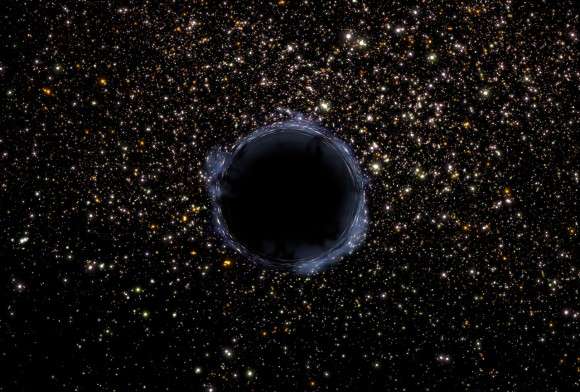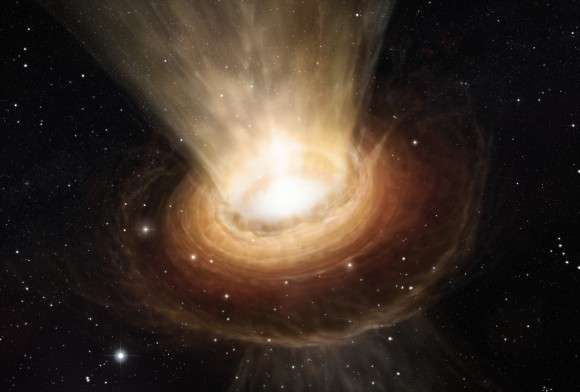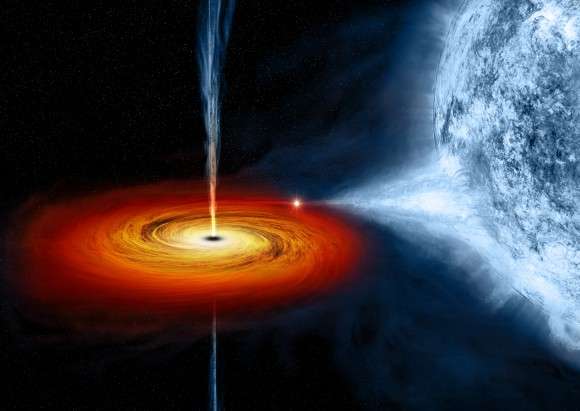Where is the closest black hole?

You know that saying, "keep your friends close, but keep your enemies closer?" That advice needs to go right out the window when we're talking black holes. They're the worst enemies you could have and you want them as far away as possible.
We're talking regions of space where matter is compressed so densely that the only way to escape is to be traveling faster than the speed of light. And as we know, you can't go faster than the speed of light. So… there's no escape.
Get too close to the black hole and you'll be compressed beyond comprehension, perhaps into an infinitely small point.
But you can be reasonably distant from a black hole too, and still have your day ruined. A black hole reaches out through the light years with its gravity. And if one were to wander too close to our Solar System, it would wreak havoc on all our precious planets.
The planets and even the Sun would be gobbled up, or smashed together, or even thrown out of the Solar System entirely.
Black holes are unkillable. Anything you might try to do to them just makes them bigger, stronger and angrier. Your only hope is to just wait them out over the eons it takes for them to evaporate.
It makes sense to keep track of all the black holes out there, just in case we might need to evacuate this Solar System in a hurry.

Where are the closest black holes?
There are two kinds of black holes out there: the supermassive black holes at the heart of every galaxy, and the stellar mass black holes formed when massive stars die in a supernova.
The supermassive ones are relatively straightforward. There's one at the heart of pretty much every single galaxy in the Universe. One in the middle of the Milky Way, located about 27,000 light-years away. One in Andromeda 2.5 million light years away, and so on.
No problem, they supermassive ones are really far away, no threat to us.
The stellar mass ones might be more of a problem.

Here's the problem. Black holes don't emit any radiation, they're completely invisible, so there's no easy way to see them in the sky. The only you'd know there's a black hole is if you were close enough to see the background starlight getting distorted. And if you're close enough to see that, you're already dead.
The closest black hole we know of is V616 Monocerotis, also known as V616 Mon. It's located about 3,000 light years away, and has between 9-13 times the mass of the Sun. We know it's there because it's located in a binary system with a star with about half the mass of the Sun. Only a black hole could make its binary partner buzz around so quickly. Astronomers can't see the black hole, they just know it's there by the whirling gravity dance.
The next closest black hole is the classic Cygnus X-1, which is about 6,000 light-years away. It has about 15 times the mass of the Sun, and once again, it's in a binary system.
The third closest black hole, is also in a binary system.
See the problem here? The reality is that a fraction of black holes are in binary systems, but that's our only way to detect them.
More likely there are more black holes much more close than the ones astronomers have been able to discover.
This all sounds terrifying, I'm sure, and now you've probably got one eye on the sky, watching for that telltale distortion of light from an approaching black hole. But these events are impossibly rare.
The Solar System has been around for more than 4.5 billion years, with all the planets going around and around without interruption. Even if a black hole passed the Solar System within a few dozen light years, it would have messed up the orbits significantly, and life probably wouldn't be here to consider this fact.
We didn't encounter a black hole in billions of years, and probably won't encounter one for billions or trillions more years.
Sadly, the answer to this question is… we don't know. We just don't know if the closest black holes is a few light years away, or it's actually V616 Mon. We'll probably never know.
Source: Universe Today




















